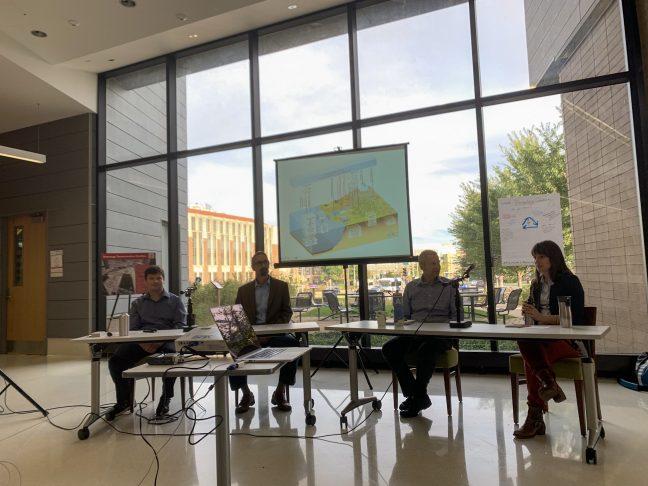The Forward in Energy Forum hosted a panel of experts Wednesday night to discuss whether or not plants could help reduce global carbon.
The panel consisted of Research Forest Products Technologist Richard Bergman from the U.S. Forest Service, assistant professor Thea Whitman from the University of Wisconsin’s Department of Soil Science and associate scientist Gregg Sanford from UW’s Department of Agronomy. All three study or work with biomass as possible mitigation strategies for atmospheric carbon.
According to the event page, the panel explored how “plants pull carbon from the atmosphere, and ultimately store more carbon in the land and in the products that we use.”
Madison closer to reaching 100% renewable energy goal as program installs solar panels
Sanford’s carbon-reducing energy solution for Wisconsin included converting annual cropland (crops worked and harvested once per year) to perennial cropland (crops worked and harvested multiple times per year).
Sanford said if cropland must remain annual, the soil should be tilled less often in order to conserve the soil carbon and preserve as much living cover on the land as possible.
“In some cases, we’re trying to do no harm and maintain as many of the resources as we have,” Sanford said.
Bergman agreed and said a key model the U.S. Forest Service believes in is keeping forests, forests. Bergman explained the use of wood materials in buildings, particularly homes, has great carbon-storing potential and ultimately emits less carbon in the building process than its steel or concrete counterparts. By keeping forests as forests, he said the cycle of carbon storage continues while industries reap the benefits of material production.
Whitman said even if these carbon sequester solutions are not as successful as they hope, they can still lead to other benefits, like increasing soil carbon.
Energy Institute kicks off national clean energy week with panel on energy innovation
“What’s great about a lot of these solutions is that if you do them, and then it turned out to sequester less carbon, well, okay, we’ve also got all of these other really great benefits as well,” Whitman said.
Whitman said while agricultural industries can do a lot to combat the earth’s carbon problem, other industries can make changes as well. Whitman mentioned that fossil fuel usage should be reduced, and ideally eliminated.
Whitman, however, felt encouraged by the recent global climate change demonstrations and said it’s never too late to improve things.
“It’s never too late to make things less bad, right?” Whitman said. “Doing something is always going to be useful. And you might not be able to lock every last molecule of carbon into the permafrost, but it’s definitely not too late to keep doing everything we can.”

















